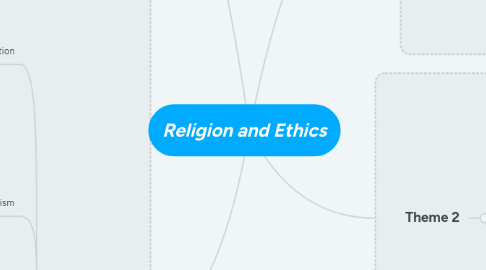
1. Theme 3
1.1. Situation Ethics
1.1.1. Rejection of legalism and antinomianism
1.1.2. The Boos Principle, 4 working Principles and 6 fundamental Principles
1.1.3. Homosexual relationships
1.1.4. Polyamorous relationships
1.2. Utilitarianism
1.2.1. Bentham's Act Utlitarianism
1.2.2. Mill's Rule Utilitarianism
1.2.3. Animal experimentation for medical research
1.2.4. Nuclear weapons as a deterrent
2. Theme 4
2.1. Predestination
2.1.1. Augustine
2.1.2. Calvin
2.1.3. Synod of Dort
2.1.4. Councils of Carthage
2.1.5. Johnathon Edwards
2.2. Determinism
2.2.1. Hard
2.2.1.1. Philosophical
2.2.1.2. Scientific
2.2.1.3. Psychological
2.2.2. Soft
2.2.2.1. Hobbes (internal/external causes)
2.2.2.2. Ayer (caused/forced acts)
2.3. Implications
2.3.1. Value in blaming agents for immoral acts
2.3.2. Usefulness of normative ethics
2.3.3. Soft determinism on moral responsibility
2.3.4. Implications on God's omnipotence
2.3.5. God's omnibenevolence
2.3.6. Use of Prayer
2.3.7. Existence of miracles
2.3.8. Link between God and Evil
2.4. Free Will
2.4.1. Pelagius
2.4.2. Arminius
2.5. Libertarianism
2.5.1. Philosophical (Sartre)
2.5.2. Scientific (Sirigu)
2.5.3. Psychological (Rogers)
3. Theme 1
3.1. Divine Command Theory
3.2. Virtue Theory
3.3. Ethical Egoism
3.4. Naturalism
3.4.1. F.H Bradley
3.4.2. Challenges
3.4.2.1. Hume
3.4.2.2. G.E Moore
3.5. Intuitionism
3.5.1. G.E Moore
3.5.2. Prichard
3.5.3. Ross
3.5.4. Challenges
3.6. Emotivism
3.6.1. Ayer
3.6.2. Stevenson
3.6.3. Challenges
3.6.3.1. Rachels
4. Theme 2
4.1. Natural Law
4.1.1. Laws and Precepts as the basis of morality
4.1.2. Role of virtues and goods in supporting moral behaviour
4.1.3. Abortion
4.1.4. Voluntary Euthanasia

